This post may contain affiliate links. Please read my disclosure policy.
Here’s something about me: I don’t usually share my supplement routine. If you’ve been following me for a while, you may have wondered why I tend to keep things quiet on this particular subject, especially since I’m an open book about so many other aspects about my journey to a balanced, cleaner lifestyle! There have been a few exceptions (like this post about what I bring with me when I travel), but for the most part, I keep my supplement regime on the DL.
But there’s a good reason for it! Let me explain…
As I see it, giving you the details of my personal supplement regimen would actually be a disservice to you. In fact, I feel like it might be a little irresponsible on my part. Why? Because supplements are not one-size-fits-all! Everyone’s body will run best with a different regimen — and some bodies may not even require supplements at all, at least not all the time. If I were to share with you about the supplements I take, I worry you might assume that the same supplements will work for you. And that’s just not the case!
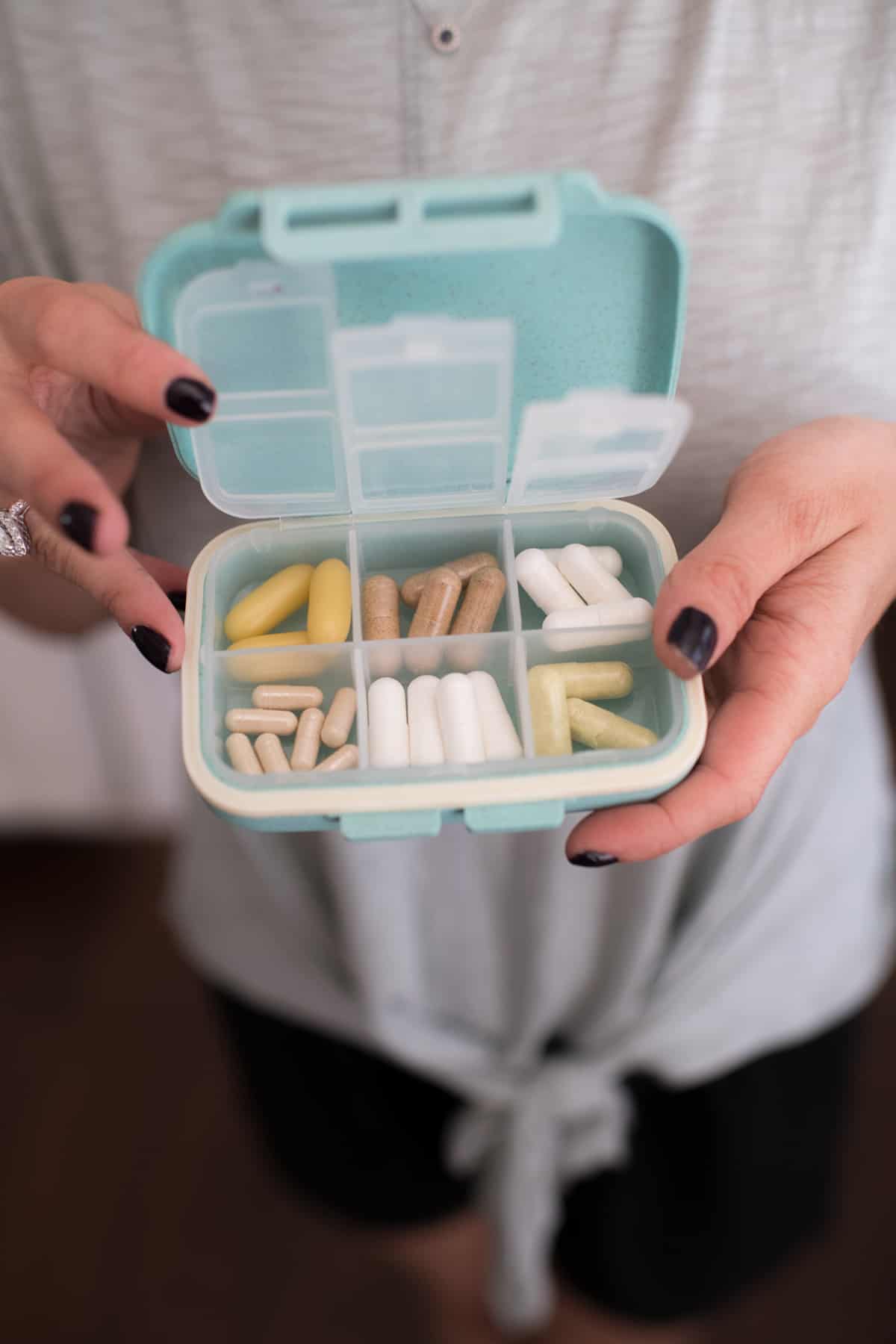
The Real Deal With Supplements
Instead of getting into the nitty gritty of how I supplement for my needs, I want to turn the focus in this post to how you can find the supplements that will work best for you — and, maybe even more importantly, how you can make sure you’re vetting supplements for quality before you start taking them.
Supplements are a $112 billion industry and have almost no regulation. The result is that vitamin manufacturers are basically operating on the honor system. Do you feel good about making decisions about what you put into your body based on the honor system? I can’t say I do. But you already knew that!
The good news is that there are rules of thumb you can follow to help you make the best possible choices about supplements. In getting familiar with these rules of thumb, you’ll gain the confidence you need to understand the standards and quality of the products you’ll find on the supplement market and to make smart choices accordingly.
First, let’s chat about making the decision to supplement.
According to a 2019 survey published by the Council for Responsible Nutrition, 77 percent of Americans report taking supplements of some kind. The most popular supplement is a multivitamin, but Vitamin D, Vitamin C, Protein, Calcium, and Vitamin B are also common choices. If you already supplement your diet with these kinds of products — or are considering doing so — you’re definitely not alone and they are good ones to pick!
Harvard Health notes that vitamin or mineral supplements are especially helpful for people living in our contemporary times because the average diet leaves so much to be desired. If you’re pursuing overall wellness (and really, who isn’t in some fashion?), you might benefit from identifying where you might be deficient from diet alone and supplementing that with, well, supplements. Most doctors will tell you that it’s best to get your nutrients from a well-balanced diet, but if that’s not feasible based on where you live or other factors, taking a vitamin or mineral in the form of a supplement could be a good move.
If you’re thinking about starting a supplement regimen — or changing up your existing regimen — it doesn’t hurt to talk to a doctor, nutritionist, or other health expert. Don’t make these decisions based purely on your own online scrolling or your best friend’s experiences! A doctor or nutritionist might recommend a course of bloodwork so they can confirm your deficiencies. Even without bloodwork, a medical professional should be able to diagnose deficiencies based on your symptoms. In any case, they can help you make sure you’re not taking any vitamins or minerals unnecessarily.
Working with an expert is also key if you have other medical conditions or are taking certain medications. They can help you make sure that the supplements you’re considering adding to the mix won’t interfere or cause problems.
Remember: everyone doesn’t need to take supplements, and even people who do need to take supplements might not need to take them indefinitely. In theory, you take a supplement so that you’ll no longer be deficient in a particular vitamin or mineral. When that point (hopefully) comes, you can stop taking the supplement. That’s why it can be useful to stay in touch with a nutritionist or doctor who can help advise you on your routine on an ongoing basis. And along with practitioners, there are even online resources now where you can have panels run on your nutrient deficiencies and so on, so you can see what you actually need in your daily routine. Pretty neat.
I think this is a good moment for a disclaimer! While I have done my fair share of research on this subject, I am not a medical professional. Please consult with an expert before making any major decisions that might affect your health!
Once you’ve taken the proper steps to determine where you’re deficient and where you should — and can — safely supplement, it’s time to really think about the brand of supplement you should take. As I said before, not all supplements are created equal. And just as I care about the quality and testing of the food I eat and the personal care products I put on my body, I care about the quality of supplements… both for myself and for you!
Know what to look for and what to avoid
Here are a few things you might find in supplement product descriptions that should give you extra confidence in what you’re looking at…
- Whole foods nutritional supplements: Most supplement brands contain nutrients sourced from cheap raw materials. And that’s not what we want! High-quality supplements will come from whole, real ingredients. The best way to figure out if a supplement comes from a whole food is to check the label! It should say “whole foods based supplement” and tell you where each nutrient comes from (for example, “omega-3 blend from algae”).
- Current Good Manufacturing Practices (cGMP): This is the gold standard for quality and safety in the industry, so you should look for it on the label of any supplement you’re thinking of taking or on the website of any manufacturer you’re thinking of buying from. While my good friends at Branch Basics (p.s. 15% off their site with code LEXI15) notes that some products that are not cGMP certified might still be high-quality, this is an easy shorthand that will help guide you in the right direction.
- USP Verified stamp: According to Robinson Med, this stamp is another great indicator of quality control. A USP Verified stamp is typically applied to vitamins sold over the counter and indicates that the product has been tested for purity so you can be sure that what’s advertised on the label is actually what you’re getting inside the bottle. Per McKel Kooienga, MS, RDN, LDN founder of Nutrition Stripped, the USP (U.S. Pharmacopeial Convention) also tests for the potency and performance of a supplement. If you’re buying your supplements over the counter, that USP stamp will really go a long way, since it constitutes third-party testing.
- Single ingredient supplements: Supplements made with a single ingredient (rather than proprietary blends) are less likely to be contaminated. Simple is good.
- “Pharmaceutical-Grade” supplements: This term is applied to products that are manufactured to the same standards as pharmaceuticals — at least in theory. Per Branch Basics (they’re so wise), supplements described as pharmaceutical-grade are usually safer than the alternatives, but not always. If you see this description for a product, it wouldn’t hurt to consult with a doctor or other medical professional to get their take!
And here are a few things to stay away from in supplement product descriptions…
- Excipients: Excipients are powders that are added to capsules or tablets to bind, lubricate, or otherwise change the texture of the supplement. Some manufacturers use rice starch or rice flour as excipients, but others use chemicals like magnesium stearate or titanium dioxide… and that’s what you want to avoid. While excipients are typically used in very small quantities that can’t hurt you on a daily basis, the cumulative effects can cause bigger problems. Best to stay away from them!
- “Other ingredients:” If you think a company is trying to be deliberately vague by using this phrase on the labels for their supplements, you’re right! A manufacturer that can’t or won’t specifically break down every ingredient included in their product probably shouldn’t be trusted.
Great! We’ve got the basics down.
A few other thoughts on how and where to buy supplements
- In general, you get what you pay for when it comes to supplements. If you find a vitamin on the cheap, there’s probably a reason that it’s cheap! Less expensive products are typically made with additives, preservatives, sweeteners, and more. Be wary of supplements that are advertised at low, low prices or that are substantially less expensive than the alternatives.
- Buying supplements from third-party vendors can introduce some variability. Big online retailers (I’m not naming names here, but you can probably guess the big online retailers I’m talking about) may not know how to store or ship the supplements correctly. They also might not advertise the correct expiration date in the product description. The bottom line: I recommend asking extra questions when buying supplements from a third party, or verifying the retailer via that platform. And if you can’t ask them those questions, you may want to shop (and support!) elsewhere. If you are shopping on a large retailer website, check who the seller is, and make sure it’s the actual brand’s storefront.
Some other food for thought…
Fun fact: according to our in-house nutritionist Gabby McGrath, what you eat can actually impact the way your body responds to supplements.
Foods that can speed up absorption of supplements:
- High-fat meals can speed up absorption of fat-soluble vitamins like E, D, and A
- A diet low in animal products will speed up your initial response to supplements like B12 and omega-3, since you’ll have lower levels of those nutrients in your blood to start with
Foods that can slow down absorption of supplements:
- Foods high in fiber can bind to certain nutritional supplements and make them more difficult to absorb
- Nuts, seeds, grains, tea, spinach, and parsley can slow down absorption
If you want to ensure a faster response to supplements, it may be worth taking a look at your diet!
Looking for brand recommendations?
My go-to brand for years now is Pure Encapsulations. I can recommend them fully because I personally use them, as does my entire family. I have vetted them and their sourcing, and have even partnered with them a handful of times here on LCL!
My friends at Branch Basics have a few other favorite supplement brands I thought worth sharing with you that they’re vetted more extensively. These companies check all the boxes as far as safety is concerned:
Remember: just because these brands come recommended doesn’t mean you should go right ahead and start purchasing products from them without doing your research. Start by asking your doctor, nutritionist, or other trusted professional for their advice on how to address any deficiencies you might have. Then, you can start digging deeper into various manufacturers and put together a supplement regimen that works best for you.
Disclaimer part II (because I really take this seriously in a post like this): Always consult with a doctor before making changes to your supplement regimen, especially if you have health issues. Try out supplements before your travels if possible so you know how you react! Pure Encapsulations is a brand that I personally use and have recommended to you all for years (you should see my supplement drawer!) so I was so excited to be able to partner with them on this post. All opinions are 100% my own, and I’d never share something I don’t personally use or fully stand behind.
‡These statements have not been evaluated by the Food & Drug Administration. These products are not intended to diagnose, treat, cure or prevent any disease.
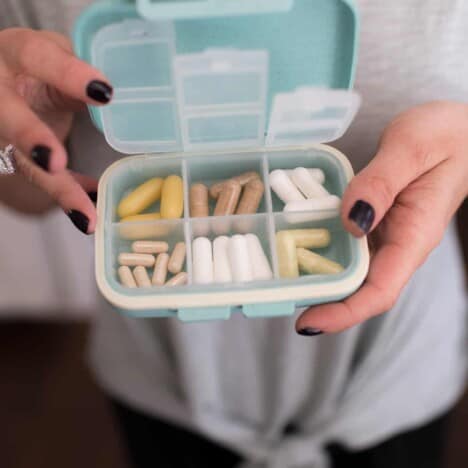
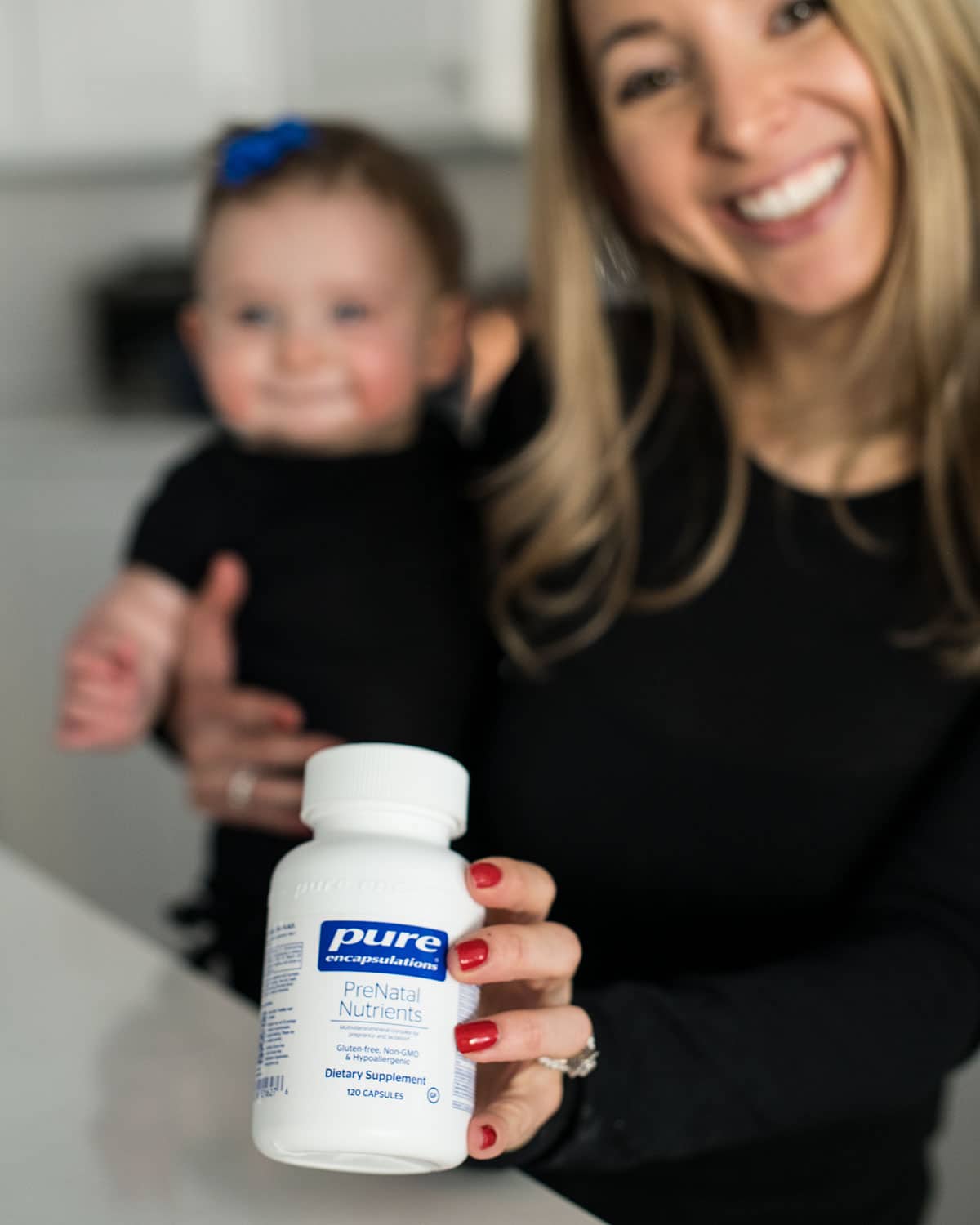
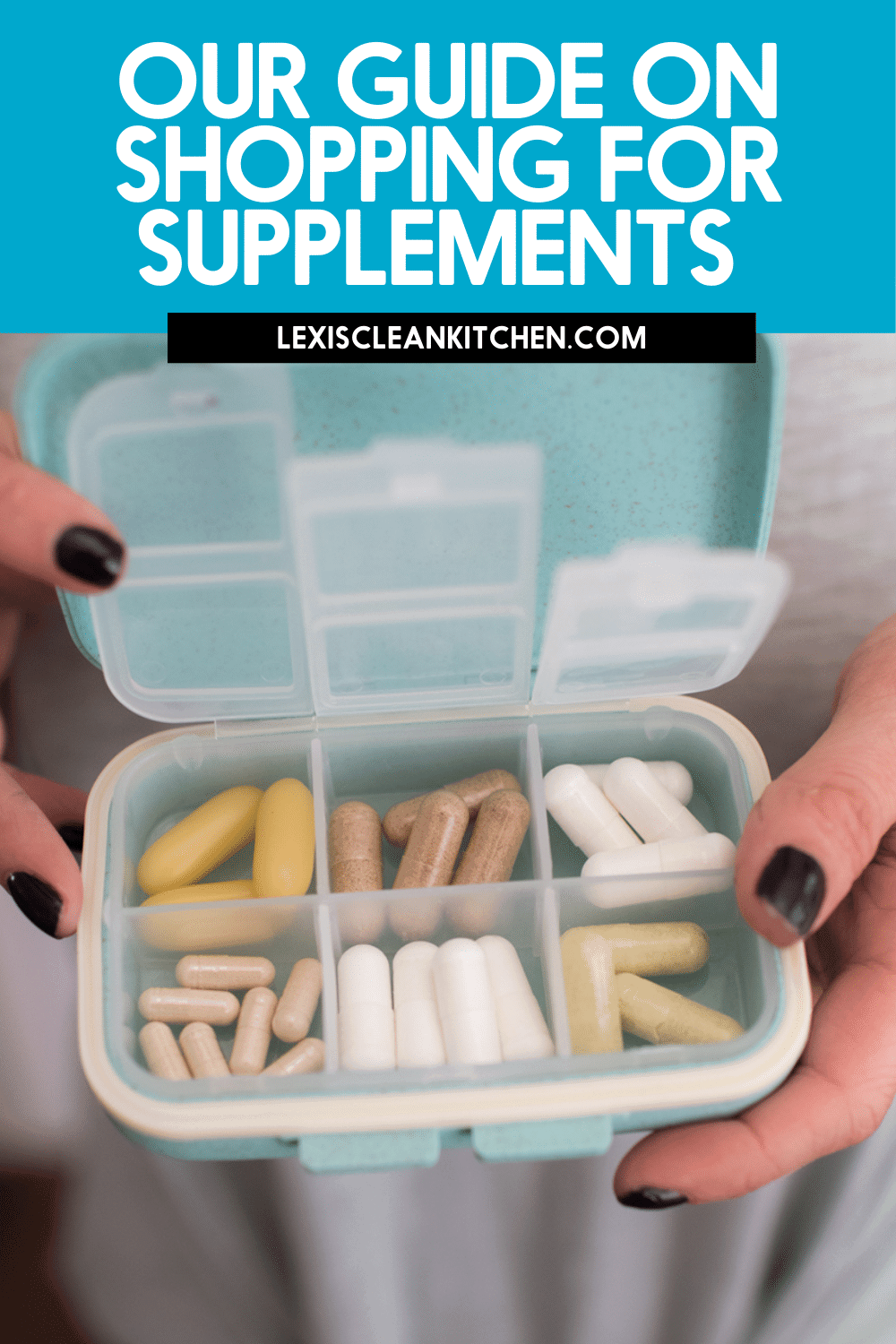

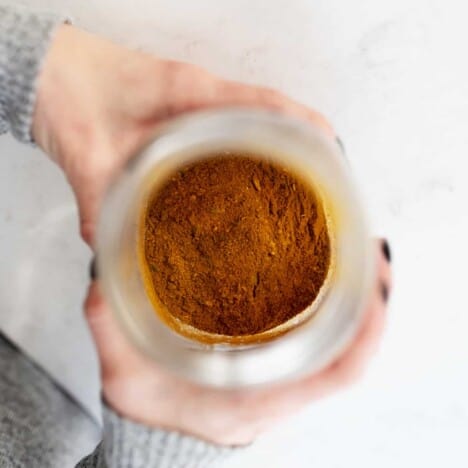



I like the vitamin container. Where did you get it? Thanks.
It’s out of stock, but here’s a similar with good reviews! https://amzn.to/3c2Yn1p
What are your thoughts on Mary Ruth Organics?